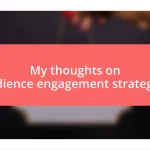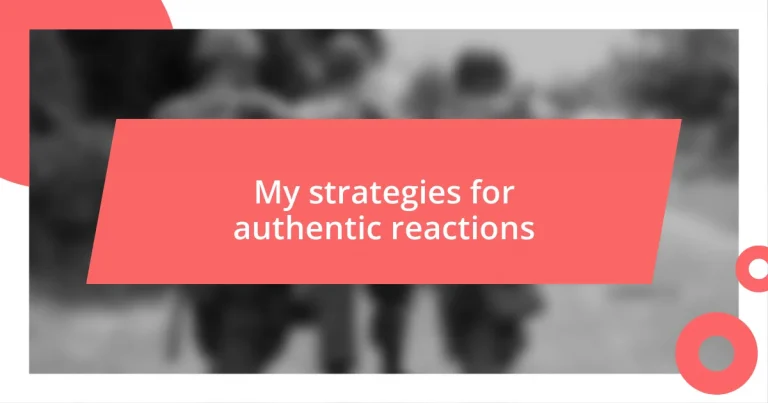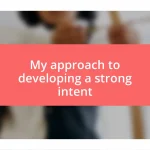Key takeaways:
- Authentic reactions rely on vulnerability, enhancing connections and enriching interpersonal communication.
- Practicing active listening and inviting feedback fosters trust and deeper relationships in both personal and professional settings.
- Reflecting on personal experiences, especially failures, serves as a powerful tool for growth and self-awareness.
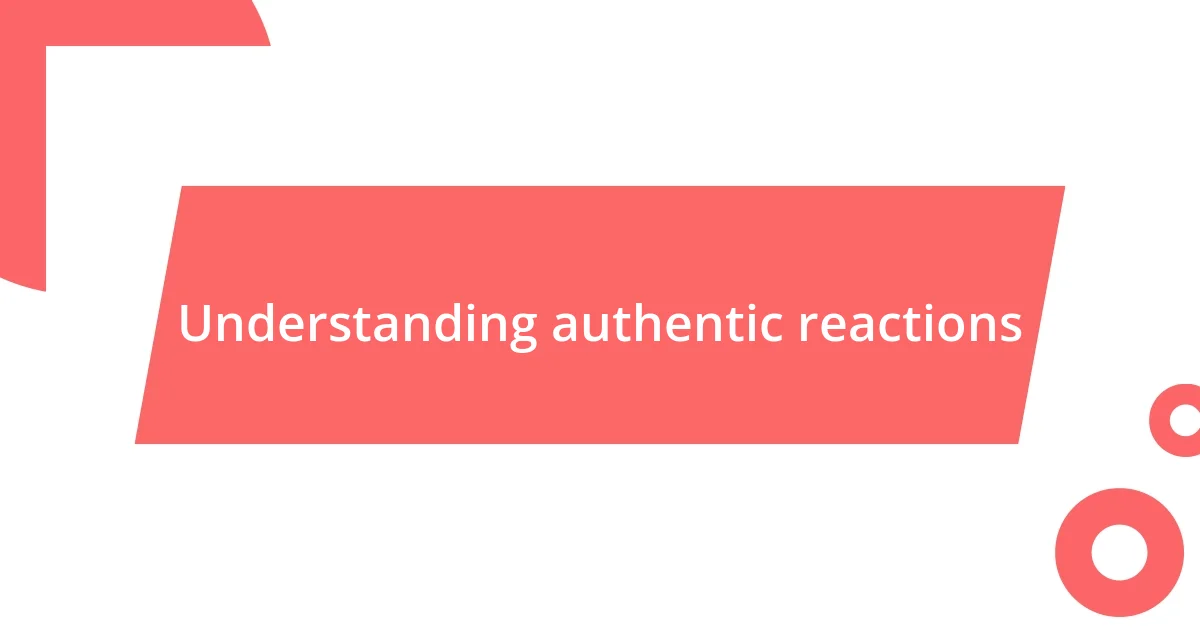
Understanding authentic reactions
Authentic reactions are those genuine responses we have to experiences, emotions, and interactions. I remember a moment at a friend’s wedding when the bride’s heartfelt thank-you speech made me tear up, not just for her happiness, but because I felt the raw sincerity in her words. Isn’t it fascinating how a simple expression of gratitude can touch us so deeply?
Understanding authentic reactions often requires tuning into our emotions and reflections. Think about a time you’ve witnessed a child burst into laughter over something simple, like a funny face. That unfiltered joy is a reminder of our innate ability to respond without pretense. Isn’t it liberating to know that such spontaneity is both beautiful and real?
What I’ve learned is that our ability to express authentic reactions hinges on vulnerability. When I let my guard down, I find myself connecting more deeply with others, whether in everyday conversations or heartfelt moments. Have you ever noticed how much richer a dialogue becomes when authenticity is at play? Those moments not only define our relationships but also reveal the true essence of who we are.
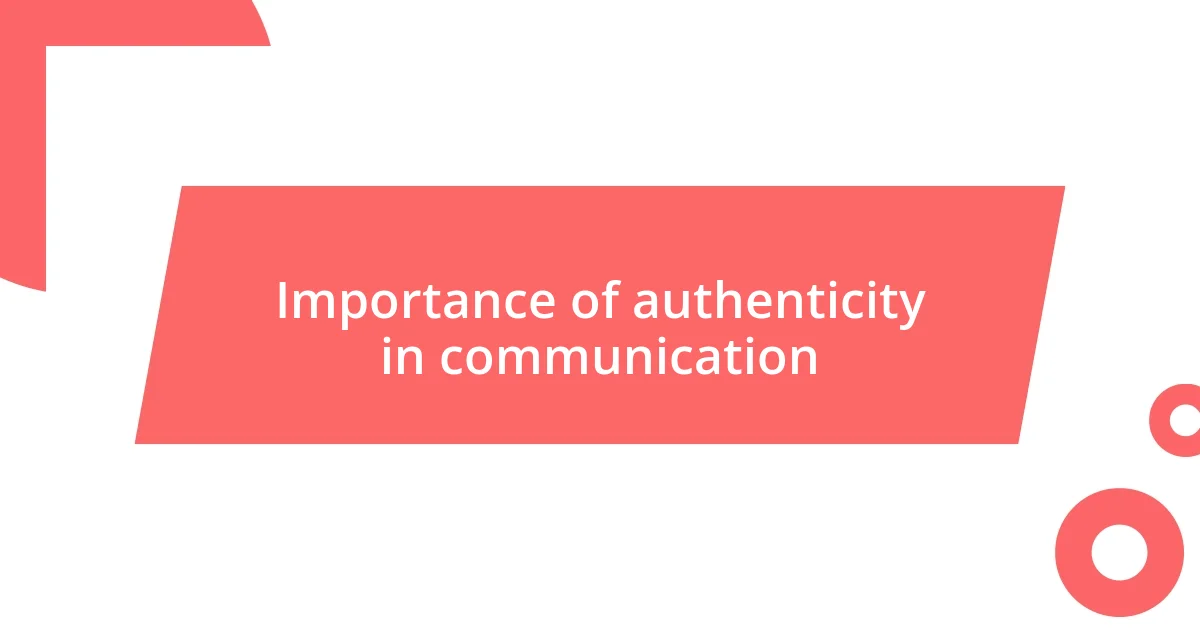
Importance of authenticity in communication
When I think about the importance of authenticity in communication, I realize it acts as a bridge between individuals. I vividly recall a time during a team meeting when a colleague boldly shared their struggles with a project. Their honesty invited others to open up about their challenges, leading to a richer discussion that ignited real collaboration. This moment reinforced my belief that when we’re genuine, we create a safe space for others to express themselves, fostering trust and enhancing our connections.
Authenticity brings more than just emotional responses; it enriches the quality of our interactions. Here are some reasons why it’s essential:
- Builds Trust: Authentic communication fosters a sense of reliability in relationships. When people see us as genuine, they feel more secure in sharing their thoughts.
- Encourages Openness: Showing our true selves can inspire others to do the same, leading to deeper conversations.
- Promotes Understanding: When we communicate authentically, our emotions become clearer, bridging gaps in understanding.
- Enhances Impact: Real emotions resonate more profoundly with others, making our messages more memorable.
Have you ever found that when you speak from the heart, the connection feels special? That’s the magic of authenticity at play.
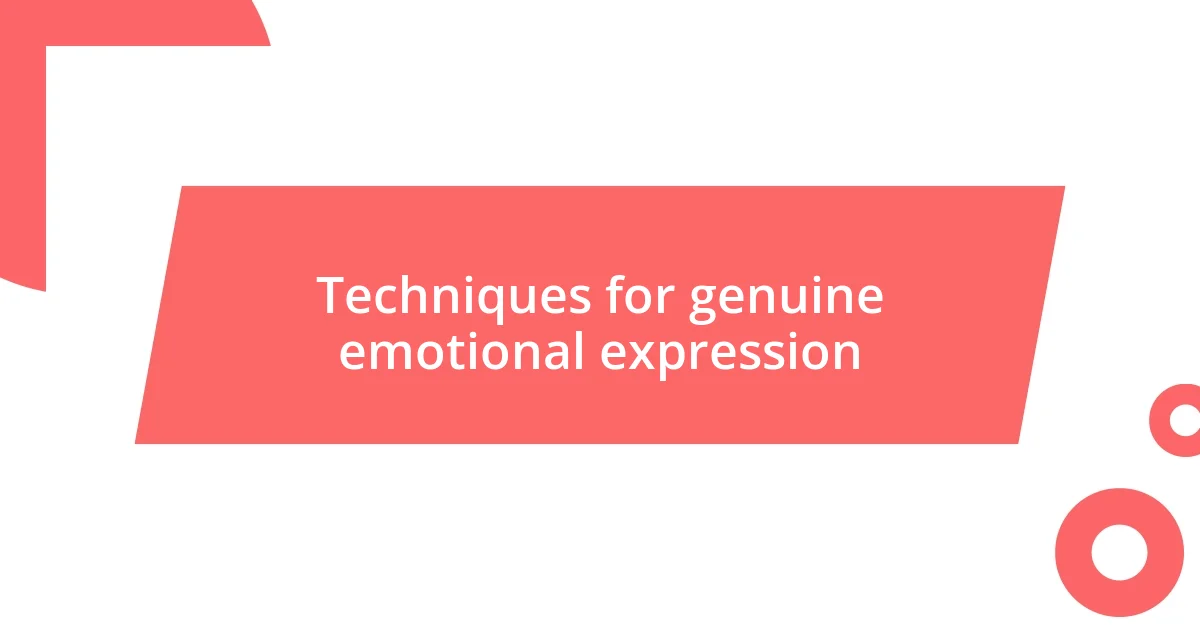
Techniques for genuine emotional expression
To express genuine emotions, one technique I’ve found incredibly effective is to practice mindful observation. I once sat in a park, observing people interacting, and I realized how their body language often conveyed feelings louder than words. This technique not only allowed me to notice subtleties in others but also encouraged me to be more attuned to my own emotional responses. Have you ever watched a couple laugh together and felt the warmth radiating from their connection? It’s a reminder that emotional expression often happens beyond vocal tones.
Another approach that resonates with me is the power of storytelling. Sharing personal experiences can evoke emotions honestly and authentically. I remember telling a friend about a tough time I faced during a job loss. As I spoke, my voice quivered and my eyes welled up, but it felt liberating to convey my vulnerability. It sparked an honest conversation that deepened our friendship. Have you thought about how sharing your story might inspire someone else to do the same?
Engaging in emotional journaling is a fantastic technique too. It’s an intimate practice that allows me to explore my feelings in a safe space. I recall a night when I poured my heart into pages, expressing joy, frustration, and everything in between. The act of writing often acts as a catharsis, peeling back layers of pretense and revealing my true emotions. Have you tried journaling? It can be a powerful tool for unearthing genuine feelings.
| Technique | Description |
|---|---|
| Mindful Observation | Paying close attention to body language and emotional cues in others, fostering awareness in oneself. |
| Storytelling | Sharing personal experiences invites authentic responses and creates deeper connections through vulnerability. |
| Emotional Journaling | Writing down feelings helps uncover authenticity, serving as a tool for reflection and emotional exploration. |
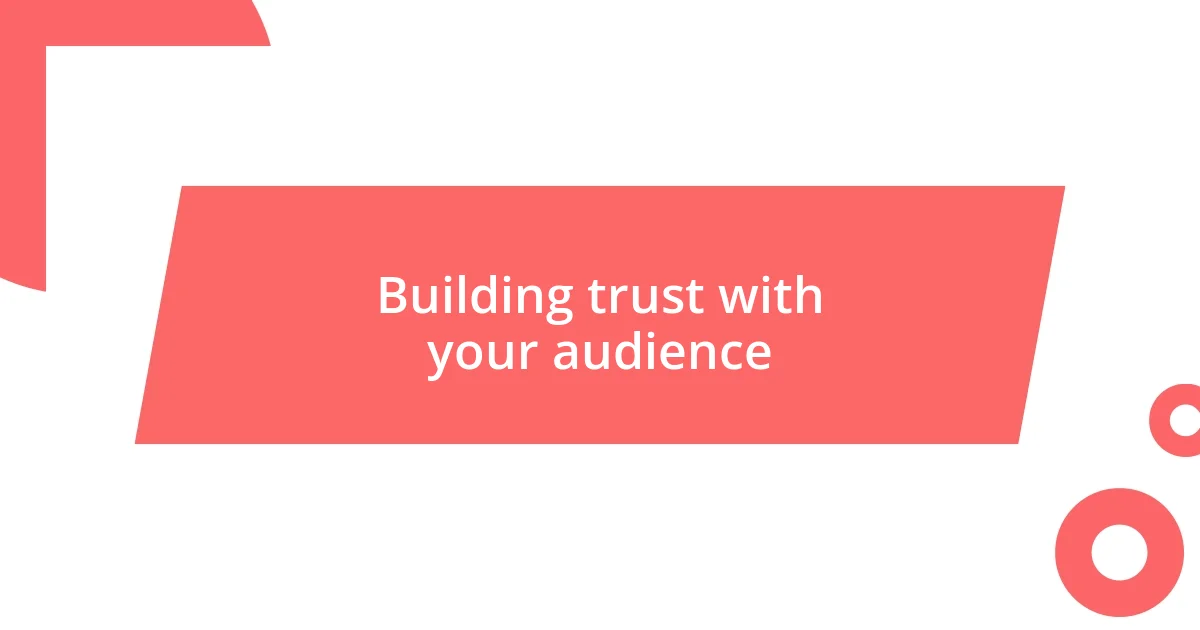
Building trust with your audience
When I reflect on building trust with my audience, one thing stands out: consistency. I remember a time when I committed to sharing my thoughts on social media daily. At first, it felt daunting, but over time, my audience came to anticipate my posts, creating a sense of reliability. Isn’t it interesting how showing up consistently can make others feel they know you better?
Another key aspect is vulnerability. I once shared a personal story about overcoming a failure in my career. It was nerve-wracking, but the authenticity of that moment resonated deeply with my followers. The responses were overwhelming, filled with messages of support and shared experiences. Isn’t it fascinating how exposing our imperfections can strengthen our bonds with others?
Lastly, I believe actively listening plays a massive role in trust-building. Engaging with my audience’s feedback not only shows that I value their opinions, but it also encourages a two-way conversation. There was an instance where I asked for input on a project I was working on, and the insights I received transformed my approach. Have you ever found that when you genuinely listen, your connections deepen in ways you never expected?
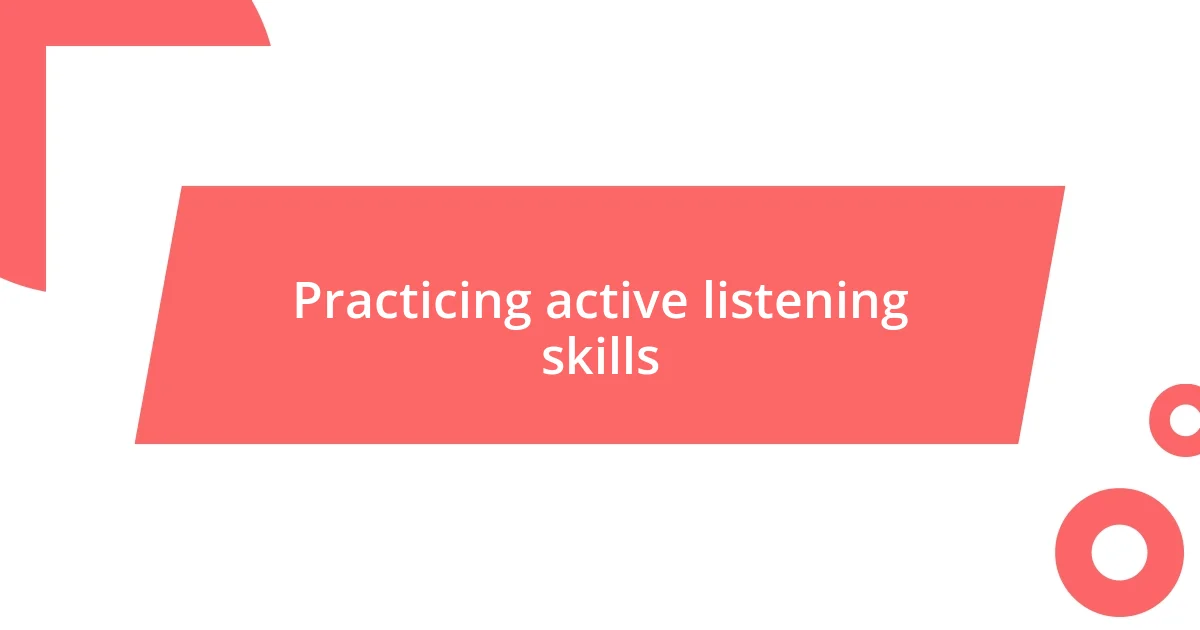
Practicing active listening skills
Active listening is one of those skills that can truly change the way we connect with others. I remember a conversation with a colleague who was venting about a challenging project. Instead of jumping in with my own thoughts, I focused on what she was saying, nodding and responding appropriately. When I finally spoke, she told me that it felt incredibly validating to have someone genuinely hear her out. Have you ever experienced such a connection when you simply listened?
To practice active listening, I often remind myself to minimize distractions. One time, during a family dinner, I put my phone away and made a conscious effort to engage with my loved ones. It was fascinating to observe how the quality of our conversation deepened. By doing this, I realized that being fully present not only strengthened our bonds but also paved the way for richer discussions. Have you tested this in your own life? The difference can be astonishing.
Another technique I’ve found helpful is asking open-ended questions after someone shares their thoughts. When a friend recently expressed anxiety about an upcoming event, I didn’t just say, “Don’t worry.” Instead, I asked, “What specifically is making you anxious?” Not only did it allow her to explore her feelings, but it also made her feel heard and understood. Isn’t it remarkable how simple questions can lead to profound insights?
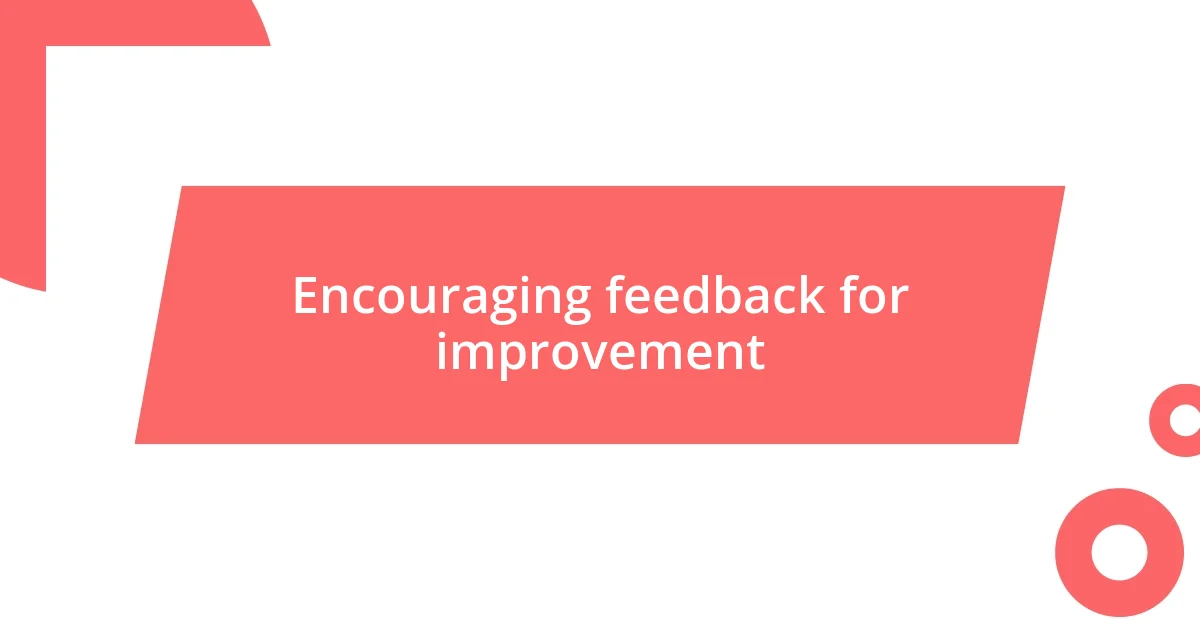
Encouraging feedback for improvement
Encouraging feedback has been a game changer for my personal growth and development. I vividly recall a time when I hosted a small workshop and actively invited participants to share their thoughts. The responses were a mix of compliments and constructive criticism, but what struck me most was how open the room felt when everyone knew their voice mattered. Isn’t incredible how this openness can breathe new life into our own perspectives?
I find that feedback shouldn’t just be a one-off request; it’s a continuous conversation. After a recent project, I sent out a survey to my clients and unexpectedly received a heartfelt testimonial alongside a suggestion for improvement. This blend of praise and critique allowed me not only to feel appreciated but also to recognize areas I could enhance. Isn’t it amazing how inviting input can foster a deeper relationship with those we serve?
In my journey, I’ve learned to celebrate both the praise and the criticism. One time, a mentor told me, “Don’t shy away from the feedback that stings a little; that’s where growth lies.” Initially, I hesitated, but I soon realized that embracing all forms of feedback paved the way for my most significant breakthroughs. Have you ever noticed how the uncomfortable truths can often lead to the most rewarding transformations?
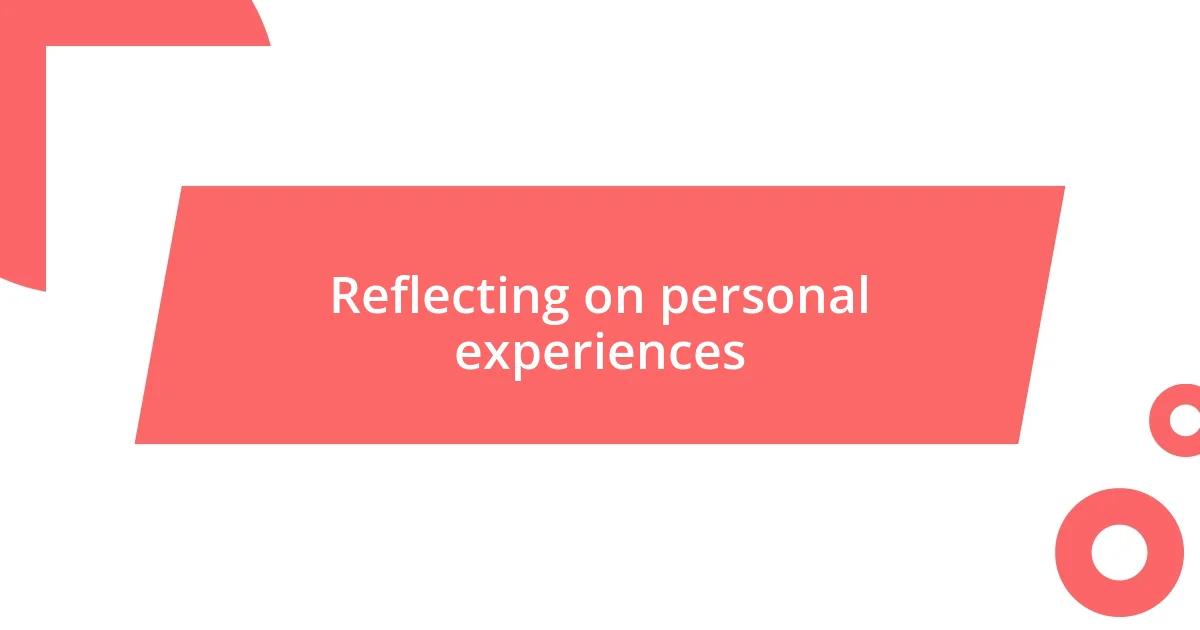
Reflecting on personal experiences
Reflecting on my personal experiences often reveals surprising lessons. I remember a time during a hiking trip when I underestimated my limits. As fatigue set in and I felt overwhelmed, I had to confront not only my physical challenges but also my emotional responses. It was a moment that taught me resilience, pushing me to reevaluate my perspective on personal strength. Have you ever found yourself in a situation where failure became your greatest teacher?
There was another instance in my career when I had to reflect on a significant mistake I made during a presentation. Initially, I was embarrassed and reluctant to face the feedback. However, after a good night’s sleep, I realized that this setback was an invaluable opportunity to grow. I reached out to colleagues for their insights, and their candid responses illuminated paths for improvement I hadn’t considered. This experience truly shifted my mindset toward viewing failures as stepping stones rather than roadblocks.
I’ve also come to appreciate how journaling enhances my ability to reflect. After a particularly emotional week, I spent time writing about my feelings and thoughts. It was enlightening to see my internal struggles on paper; it transformed confusion into clarity. Through this practice, I found that reflecting on my experiences not only fosters growth but also cultivates a deeper understanding of myself. Have you tried journaling? The insights it can bring are undeniably powerful.








